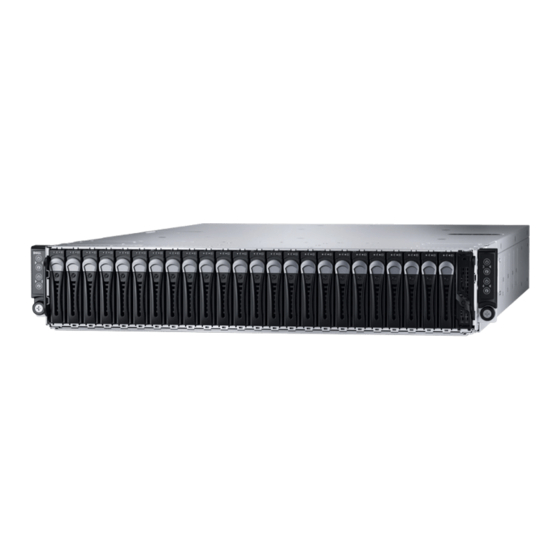Dell XC6320 Manual de soluções do dispositivo hiperconvergente de escala Web - Página 9
Procurar online ou descarregar pdf Manual de soluções do dispositivo hiperconvergente de escala Web para Ambiente de trabalho Dell XC6320. Dell XC6320 23 páginas. Web-scale hyperconverged appliance
Também para Dell XC6320: Começar a trabalhar (50 páginas)

Deploying your system
Before you deploy your system, ensure that you read through this document and have yourself familiarized with the process and
required materials.
WARNING: Before you set up and operate your Dell XC730-16G, review the safety instructions that shipped with your
storage enclosure.
WARNING: The weight of your system without the physical disk drives installed (empty weight) is 20.8 kg and 45.86 lb.
WARNING: Your system must be installed by Dell certified service technicians.
CAUTION: Before installing your system in the rack, make sure that the weight of the system does not exceed the weight
limit of the rack. For more information, see the Rack Installation instructions that shipped with your system.
NOTE: For weight stability, always load the rack by using bottom-up approach.
NOTE: This solution is deployed by Dell Services. The following deployment steps provide an outline of what Dell
Services accomplishes during the deployment process.
Important information about SATADOM
The SATA Disk‐On‐Motherboard (SATADOM) shipped with XC Series appliances is intended as an appliance boot device.
NOTE: Write intensive activities and processes leveraged by XC appliances, are intended to take place on the SSDs and
HDDs and not the boot device.
The hypervisor boot device is not intended for application use.
WARNING: Adding additional write intensive software to the SATADOM boot disk results in heavy wear on the device
beyond design specifications resulting in premature hardware failure.
You should not run applications on the hypervisor operating system.
Examples of write intensive applications
Following are the examples of write intensive applications:
•
System Center Agents.
– System Center Configuration Manager (CCMExec.exe).
– System Center Operations Manager (MonitoringHost.exe).
•
Write‐intensive Agents.
•
Databases.
•
Disk management utilities (third-party disk defragmentation or partitioning tools).
•
Additional roles outside of the appliance's intended use (web server, domain controller, RDS, and so on.).
•
Client‐based Antivirus.
•
Run Virtual Machines directly on the SATADOM. Ensure that the Virtual Machines run on Solid State Drives (SSDs) and Hard
Disk Drives (HDDs).
5
9
